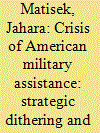| Srl | Item |
| 1 |
ID:
161350


|
|
|
|
|
| Summary/Abstract |
The United States has provided substantial amounts of military assistance and aid since the end of World War Two. During the Cold War, it proved vital in protecting numerous regimes from communist takeovers. Successful outcomes occurred when American leaders made large initial aid commitments, and the states had the capacity and political willpower to use it effectively. However, Vietnam was an example of how U.S. support lagged, as leaders in Saigon preferred political survival instead of creating regime legitimacy. Following 9/11, American security aid focused on making weak countries develop stronger security forces. Unfortunately, this created Fabergé egg militaries: expensive and easily broken by insurgents. This article suggests long-term strategic commitments need to be made alongside more resources for the American State Department and similar organizations to focus on the politics of state-building. Finally, this article suggests strategies, such as “whole-of-government” approaches, to improve long-term security and political institution building.
|
|
|
|
|
|
|
|
|
|
|
|
|
|
|
|
| 2 |
ID:
164151


|
|
|
|
|
| Summary/Abstract |
The practice of dispatching teams of police advisors to other states to build or train foreign security forces began at the end of the nineteenth century, yet there exists no definitive history of the practice, or any definitive theoretical approach underpinning why such missions succeed or fail. Drawing upon their recent edited book on expeditionary police advising, and by examining the donor or sending states, the host nations, and the use of police in counterinsurgency situations, the authors present some key reasons why such missions fail, and lay some groundwork for additional study of this important subject.
|
|
|
|
|
|
|
|
|
|
|
|
|
|
|
|